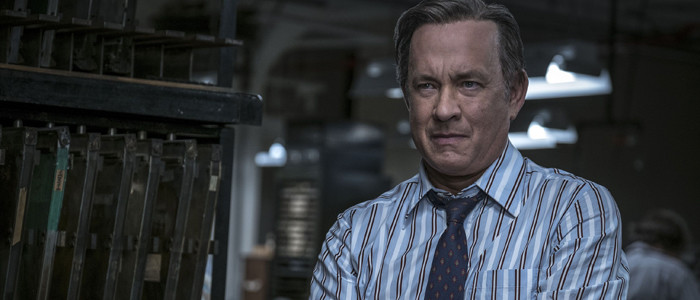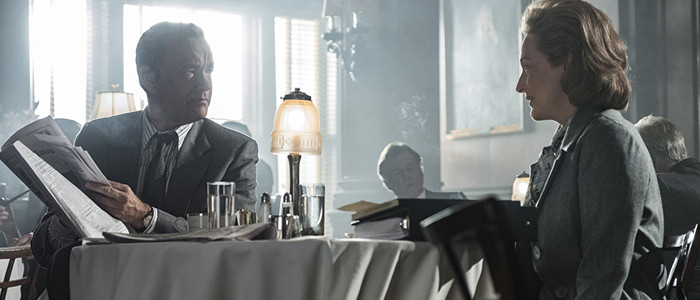'The Post' Q&A: Streep, Hanks, And Whitford On Making Spielberg's Latest Masterpiece
Steven Spielberg's upcoming movie The Post is one of the most vital, compelling pieces of filmmaking of his career. Full reviews are still under embargo, but the early buzz from critics who've seen early screenings is overwhelmingly positive.
I managed to get into one of those early screenings last night on the 20th Century Fox studio lot, where stars Meryl Streep, Tom Hanks, and Bradley Whitford appeared for a Q&A after the movie. What follows is a transcript of some of the most fascinating moments of that conversation, including stories about how ridiculously quickly this project came together, Spielberg's approach to directing, and the impact of the movie's costume designer.
Meryl Streep was attached to the film even before Spielberg came on board:
Streep: [Producer] Amy Pascal sent me Liz Hannah's script, and I just loved it. I didn't think that it could get made. And then Steven stepped in, and everything came together in like twenty minutes...Steven was prepping another movie in Italy. He had his whole crew there. Everything was set up, sets built, ready to go. Is that right?
Hanks: Yeah, the role was for a 7-year-old kid or a 13-year-old kid.
Streep: And I think he had to be bilingual in Italian and Hebrew.
Whitford: (Jokingly) I was up for that. (Everyone laughs)
Streep: And they couldn't find the little boy. [For the film The Kidnapping of Edgardo Mortara.] Someone passed him the script, and he flew his crew to New York, set them up, and he started like two weeks later. It's amazing how quickly he did it, and how quickly he made the film. We finished shooting at the end of July, and he had a cut two weeks later. And it's film – it's 35 millimeter film.
Hanks: We started shooting the first of May. I read it in February, so there was about a ten week prep, and both during it and throughout the shooting, [Spotlight co-writer] Josh Singer came on and worked hand in hand with Liz Hannah. Because the early drafts of it were missing essentially everything that explained what the Pentagon Papers were. The Pentagon Papers were kind of like a box of paper. We talked about it like everybody knew what was in it, but Steven definitely wanted to know the meat and potatoes of it.
Some of the scenes specifically came out of a two-or-three-hour get together we had with Daniel Ellsberg himself. He told the story of being on the plane and being called to the front to tell Secretary McNamara that what he was struck by was that absolutely nothing had changed in the time that he had been [in Vietnam]. We heard that, and then we shot it sometime in June. It was like working at MGM or on this lot back in the day. You banged out a movie in eight weeks, and it turned out to be something like It's a Wonderful Life. It was a fast shoot.
The script was purchased in October of last year, before the results of the presidential election came in:
Hanks: Of course, in October, we did not know what the future held as of November 8th.
Moderator: Yeah, she said she was making this with the idea that Hillary would have been elected President.
Hanks: Remember those fun-filled days? When that was a possibility? Remember that great, hopeful era? Not to step on anybody's toes – you get to vote for whoever you want to in this great country of ours. But had it gone that way, we would have been making probably a quaint museum piece in which everybody would have been ooh-ing and aah-ing about the ugly fashions and the big cars, but instead we were actually making a story that was ripped right out of 2017's headlines.
The movie occasionally cuts to wide shots of Richard Nixon in the White House, and all of the audio used during those stretches are actually the real recordings of the real man himself. Hanks revealed this in the most "America's Dad" way possible:
Hanks: That's actually from the White House tapes. Kissinger as well. It's taken right from the tapes. It's kind of extraordinary. I always think – Nixon put in the machines. He knew he was being [recorded]. (Nixon impression) 'Let me tell you about these c***suckers!' Your kids are going to hear this, Dick! Your grandchildren! Go easy on the expletives, for crying out loud.
For Hanks, developing his portrayal of Washington Post editor Ben Bradlee involved speaking with the real Bradlee (before he passed away), but there was more to it than that:
Hanks: There's also the everlasting presence of Jason Robards in Ben Bradlee.
Moderator: A great Oscar-winning performance in All The President's Men.
Hanks: I worked with Jason at one point, and I called him Mr. Robards for the first six weeks. 'Will you knock it off, kid?' Between the two of them, there was an iconography that I had to slide in between, quite frankly. Ben had a degree of confidence, he owned a room when he walked into it. And the interpretation that Jason Robards did as him is sort of like playing Hamlet after somebody else has played Hamlet. You've gotta find some way into it. You can't just mimic, but you can't sluff off.
Hanks gives a tremendous amount of credit to the movie's costume designer for its overall success:
Hanks: Anne Roth and her costumes, the way she approaches costuming and actors, is the greatest relationship an actor can have with somebody who is responsible for the look. She peppers you with questions. You're there and you're trying to put on a pair of 1970s pants that will somehow flatter your ass. (laughs) They weren't really built for that...you'd be trying these things. She'd say, 'Put on these shoes. Walk with me in these shoes. What are you doing with your hands? There you go! Yeah.'
We were trying on a bunch of different shirts and getting the measurements, and she's fussing, and she says to me, 'Do you know why Ben owned the room?' And I said, 'Because he knew.' 'Because he knew!' That's somebody who's going for the same ephemeral, elusive quality to a character, and she knows that the most visible layer of that is the fabric that she puts you in.
Whitford: Somebody please make a documentary about Anne Roth.
Streep: I've tried. We really have. A lot of people have tried. But she won't do it. She's completely an impossible person.
Whitford: At the end of my fitting, she said, 'That's what you're wearing. I don't give a shit what Spielberg says!'
Hanks: Steven called her the co-director of the film a few days she was there.
Hanks has worked with Spielberg five times now, but this marks the first time he's worked with Streep (and the first time Streep had ever worked with Spielberg):
Hanks: Everybody who played a reporter, we got together at my place. We had pie and coffee. I just said, 'Look, Steven is not going to rehearse us. We have to know what these scenes are. Show up on time. Let's all know the dialogue, and let's all have an idea of what we're going to do. If we do that, Steven will love us, and he will use us throughout the course of it. Don't be surprised – he's going to give everybody more do to than what's on the page.' One of the extraordinary things about all of the movies I've worked with Steven on is that everybody has a good part.
Streep: I was apprehensive because I knew Tom had worked with him, and his whole crew were a group of people who were used to him. You never know – everybody works differently. I wasn't invited to the reporter's things, because [Hanks] forgot I was the boss. (laughs) But no one told me that Steven doesn't rehearse. Not at all. You walk on, and we shoot. I need a little ease in, just to remember the lines the first couple of times. That was very intimidating.
Whitford told an illuminating story about Spielberg's approach to filmmaking that involved the first time Whitford read the script in a secure room at Amblin, and Spielberg told him there wasn't going to be any rehearsal or a read-through.
Whitford: I was like, 'Why don't you like read-throughs?' And he said – I hope I'm not getting in trouble – he said, 'I think it makes people think that this process is more democratic than it actually is.' I was like, 'I'll be there, and I'll be ready, buddy!'
Streep spoke about the thing that shocked her the most about being on the set and working with everyone:
Streep: What really shocked me, was I really thought it was going to be this well-oiled machine where everybody knew what they were doing except me. I did! I was terrified at first. One of the earliest things we shot was a very long scene between the two of us, an introductory scene to our relationship. It told a lot within that seven pages...
But within that, he gave us so much freedom. He ended up [using] just the master [shot]. That's like letting the actors edit, because we take our pauses, or we don't. We came in and covered it, took forever, and then he came back after we killed ourselves on the closeups, and he said, 'You know, I think I like the second take we used this morning. The master!' He just lives in the moment. It isn't pre-planned. It's not a Hitchcock thing where everything's storyboarded. It lives. The process lives in the moment, and that's so touching to me. He's living it.
To wrap up the evening, Hanks left us with a message as vital as anything that appears in The Post:
Hanks: Here's the extraordinary thing: there is an election in less than a year. And if you don't vote in that election, you get the government you deserve.
The Post arrives in theaters on December 22, 2017.


